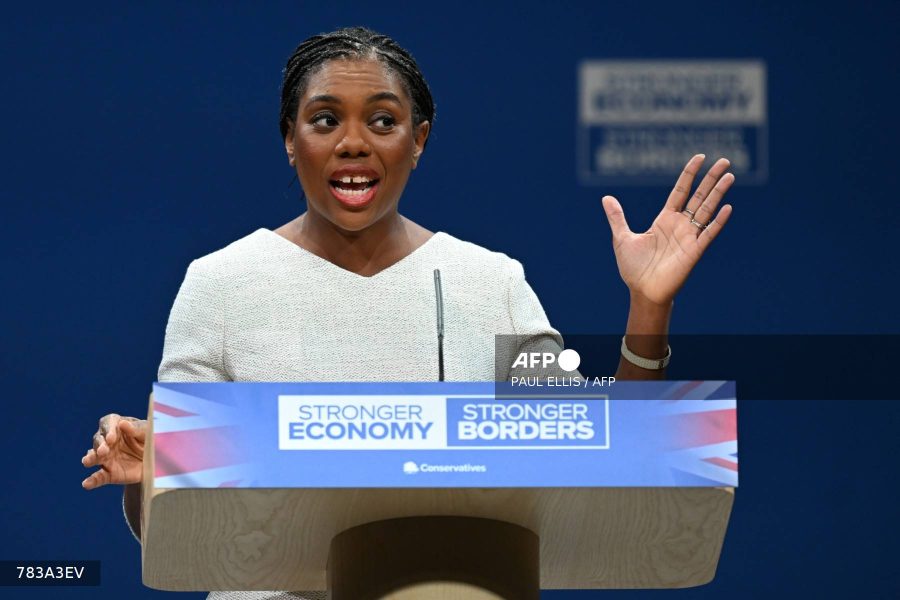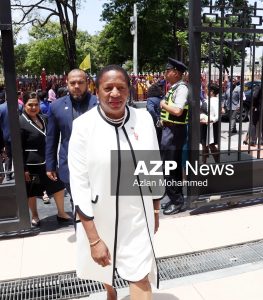Caption: Britain’s main opposition Conservative Party leader Kemi Badenoch delivers a speech on the final day of the annual Conservative Party conference in Manchester, north-west England, on October 8, 2025.
LONDON – The leader of Britain’s Conservative Party, once an electoral powerhouse now facing an uncertain future, called for it to return to its roots at its annual meeting Wednesday, urging the creation of a “blueprint for Britain” based on conservative values.
Kemi Badenoch sought to turn around the woes of the party, which has been led by such political titans as Winston Churchill and Margaret Thatcher, and has slumped further in polls since its resounding defeat in the 2024 general election.
In her first party conference speech as leader, she vowed to return the party to the “same timeless Conservative principles” which once made it an election-winning machine.
The Tories were “the only party that can meet the test of our generation,” she said, highlighting Britain’s flagging economy and high immigration numbers.
Slamming Labour Prime Minister Keir Starmer as “weak” and “useless”, Badenoch largely ignored the upstart hard-right Reform UK party that is eating into Conservative support and raising questions about its political future.
“It is existential,” political scientist Robert Ford said of the crisis gripping the United Kingdom’s oldest political party, which was founded in the 1830s.
“On the current numbers, you’ll be able to fit Conservative MPs (members of parliament) into a small coach after the next election,” the University of Manchester professor added.
The Tories have run Britain for large chunks of recent history, including an 18-year stretch between 1979 and 1997 and 14 years from 2010 to 2024.
They have won more general elections and returned the most prime ministers of any modern-day UK political party, ruthlessly adapting to tap into the prevailing public mood of the time.
Economy and immigration
But the 2016 Brexit referendum sparked an unprecedented decline in the party’s fortunes, triggering the resignation from Downing Street of Conservative prime minister David Cameron and unleashing bitter factional infighting.
The Tories cycled through another four leaders including Boris Johnson, who was brought down by numerous scandals, and Liz Truss, who was forced to quit after a disastrous budget, before Britons booted them from office in July last year.
“They’ve only got themselves to blame in a sense,” Tim Bale, professor of politics at Queen Mary University of London told AFP.
“They made all sorts of promises on immigration and the economy, which they didn’t deliver on in government. The public are rightly frustrated with them.”
Last year’s election, won by Keir Starmer’s Labour party, saw the Conservatives reduced to just 121 lawmakers in Britain’s 650-seat parliament — their worst defeat in a general election ever.
Their fortunes have since fallen further as the anti-immigrant Reform party, led by firebrand arch-Eurosceptic Nigel Farage, outflanks the Tories on the right.
In her speech to a packed auditorium — a contrast to the otherwise poorly-attended four-day party conference in Manchester, northern England — Badenoch announced policy measures to slash the UK’s deficit and “radically reform our welfare system”.
Earlier this week she announced that any future Conservative government led by her would take Britain out of the European Convention on Human Rights and deport 150,000 irregular migrants a year.
Election wipeout?
But with polls showing the next election, expected in 2029, gearing up to be a straight fight between Starmer and Farage, many people around Westminster are speculating she will be gone by then.
While the Conservatives have suffered heavy defeats before, notably in 1945 and 1997, they have always had time to rebuild against Labour — a luxury the rise of Reform does not grant them today.
“The hole they’re in is way, way deeper than any hole they’ve been in for a century or so,” said Bale.
Several former Tory MPs, one sitting lawmaker, and dozens of councillors have defected to Reform in recent months as surveys show the Conservatives heading for a near wipeout at the next election.
A YouGov poll released last month found that if a general election was to be held now, the Conservatives would be reduced to just 45 MPs.
That would put it in fourth place, behind the centrist Liberal Democrats, with Reform just short of a majority on 311 seats.
In such a scenario it is not inconceivable that Farage could ask the Tories to become a junior partner in a governing coalition.
Ford reckons that while some Conservative MPs and activists might find this tempting, they will be fearful of “a black widow spider effect”.
“You mate with the larger one and it eats you,” he told AFP. (AFP)
![]()













